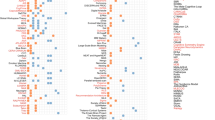Abstract
Explicitness has usually been approached from two points of view, labelled by Kirsh the structural and the process view, that hold opposite assumptions to determine when information is explicit. In this paper, we offer an intermediate view that retains intuitions from both of them. We establish three conditions for explicit information that preserve a structural requirement, and a notion of explicitness as a continuous dimension. A problem with the former accounts was their disconnection with psychological work on the issue. We review studies by Karmiloff-Smith, and Shanks and St. John to show that the proposed conditions have psychological grounds. Finally, we examine the problem of explicit rules in connectionist systems in the light of our framework.
Similar content being viewed by others
References
Adams, F., Aizawa, K. and Fuller, G. (1992), ‘Rules in Programming Languages and Networks.’ in Dinsmore (1992), pp. 49–68.
Clark, A. (1993) Associative Engines, Cambridge, MA, MIT Press.
Clark, A. and Karmiloff-Smith, A. (1993), ‘The Cognizer's Innards: A Psychological and Philosophical Perspective on the Development of Thought’, Mind and Language 8, 487–519.
Cummins, R. (1986) Inexplicit Information. in M. Brand and R. Harnish (eds.), The Representation of Knowledge and Belief, Tucson, AZ, Univ. of Arizona Press. pp. 116–126.
Cummins, R. (1989) Mental Representation, Cambridge, MA, MIT Press.
Davies, M. (1990), Knowledge of Rules in Connectionist Networks, Intellectica, 9–10: 81–126.
Dinsmore, J. (ed) (1992), The Symbolic and Connectionist Paradigms: Closing the Gap, New Jersey, Erlbaum.
Fodor, J. and Pylyshyn, Z.W. (1988), Connectionism and Cognitive Architecture: A Critical Analysis, Cognition, 28: 3–71.
Hadley, R.F. (1993), Connectionism, Explicit Rules, and Symbolic Manipulation, Minds and Machines, 3: 183–200.
Hadley, R.F. (1995) The Explicit-Implicit Distinction. Minds and Machines, 5: pp. 219–242.
Karmiloff-Smith, A. (1992), Beyond Modularity, Cambridge, MA: MIT Press.
Karmiloff-Smith, A. (1994), Précis of Beyond Modularity, Behavioral and Brain Sciences, 17: 693–745.
Karmiloff-Smith, A. and Clark, A. (1993) What's Special about the Development of the Human Mind/Brain? Mind and Language, 8: 569–581.
Kirsh, D. (1990), When is Information Explicitly Represented?, in P. Hanson (ed.), Information, Language and Cognition: Vancouver Studies in Cognitive Science Vancouver: University of British Columbia Press, pp. 340–365.
Plunkett, K. (1993), Making Nets Work Hard. Mind and Language, 8: 549–558.
Raffman, D. (1993), Language, Music and Mind, Cambridge, MA: MIT Press.
Shanks, D.R. and St. John, M.F. (1994) Characteristics of Dissociable Human Learning Systems, Behavioral and Brain Sciences, 17: 367–447.
Skokowski, P.G. (1994), Can Computers Carry Content ‘Inexplicitly’? Minds and Machines, 4: 333–344.
Smolensky, P. (1990), Tensor Product Variable Binding and the Representation of Symbolic Structures in Connectionist Systems, Artificial Intelligence, 46: 159–216.
Sperber, D. and Wilson, D. (1986), Relevance: Communication and Cognition, Oxford: Blackwell.
Sun, R. (1995), Schemas, Logics, and Neural Assemblies. Applied Intelligence, 5.
Author information
Authors and Affiliations
Rights and permissions
About this article
Cite this article
Martínez, F., Ezquerro, J. Explicitness With Psychological Ground. Minds and Machines 8, 353–374 (1998). https://doi.org/10.1023/A:1008275132559
Issue Date:
DOI: https://doi.org/10.1023/A:1008275132559




